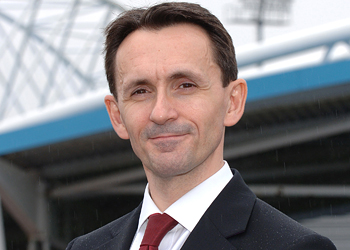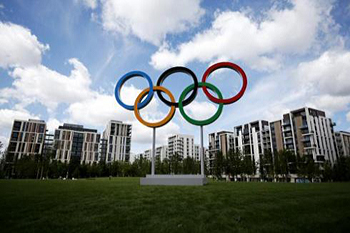2012 Olympics raises bar for Rio
Tue, 13 Nov 2012 14:01:00 GMT
Huddersfield professor’s ground-breaking research shows just how well the 2012 Games were run
 UNIQUE research conducted by a University of Huddersfield professor confirms just how successfully the 2012 Olympics and Paralympics were designed, organised and delivered. His findings will reveal to planners of the 2016 Games in Brazil just what they must do to meet or exceed the standards set by London.
UNIQUE research conducted by a University of Huddersfield professor confirms just how successfully the 2012 Olympics and Paralympics were designed, organised and delivered. His findings will reveal to planners of the 2016 Games in Brazil just what they must do to meet or exceed the standards set by London.
Professor David Bamford (pictured), an expert in the theory of operations management and how it can be applied to the sports arena, was granted full access to the Paralympics village in London and with his team of researchers he quizzed hundreds of athletes, seeking their views on the organisation, facilities and other aspects of the Games.
This was the largest survey that had been carried for a Paralympic Games and the responses were highly positive.
“From a service quality perspective, they were exceptionally high,” said Professor Bamford. “This speaks well for the attention to detail and the design of the facilities provided at London 2012. Now the opportunity and the challenge for Brazil is how they are going to replicate this. The bar is very high indeed.”
A special questionnaire was devised and a total of 250 Paralympians took part, either in face-to-face interviews or by responding online. The blend of nationalities, athletic disciplines and disabilities ensured that the findings were statistically valid.
The questions covered topics such as transport, catering, competition venues, staff, ceremonies and anti-doping procedures. Respondents attached most importance to the facilities at the Paralympics village (pictured below).
 Questions used the Likert scale - ranging from “dissatisfied” to “very satisfied” – and 70 per cent of the responses were in the “very satisfied” range, said Professor Bamford.
Questions used the Likert scale - ranging from “dissatisfied” to “very satisfied” – and 70 per cent of the responses were in the “very satisfied” range, said Professor Bamford.
“That went right across the board from the Paralympics village through to the delivery of anti-doping services. It was an extremely positive set of feedback. And the volunteers and staff were by far the best rated of all the services. In terms of their performance, they were absolutely outstanding,” he added.
International Paralympics Committee
The research project was initiated by the International Paralympics Committee (IPC) in tandem with the Manchester-based World Academy of Sport, which undertakes the education delivery of knowledge management for the IPC which included the IPC Observers Programme for future Paralympic Games organisers.
An IPC Academy Campus was instituted throughout the Games and Professor Bamford was appointed its Research Fellow. He then recruited five interns in conjunction with the IPC and WAoS to assist with the research. The team was granted complete access to the Paralympic village and competition venues whilethe games were in progress.

The aim of the project was to establish a benchmark for the provision of services at the Paralympics particularly in relation to infrastructure requirements and operational delivery, said Professor Bamford. His preliminary report will form part of the discussions at the official IPC Debrief on London 2012 in Rio during late November. His full report will then be available for Games organisers when they meet again in the spring of 2013, this time to look ahead to 2016 and adopt key recommendations into their planning for the next edition of the Paralympic Games.
Further outputs from the Athletes Client Experience Survey - as it was named – will include academic papers, and case studies will be used for teaching purposes at the University of Huddersfield’s Business School, where David Bamford is Professor of Operations Management.







